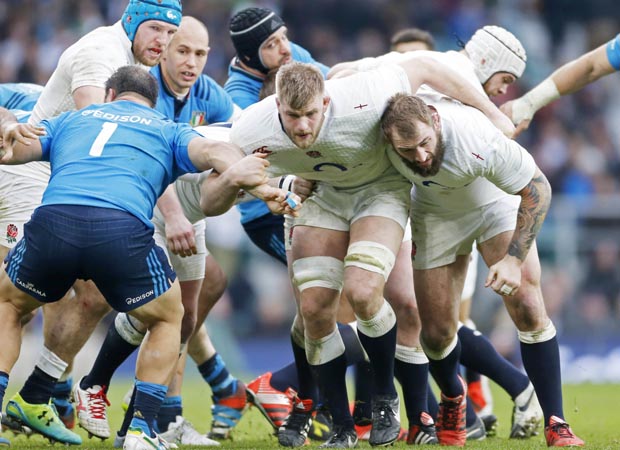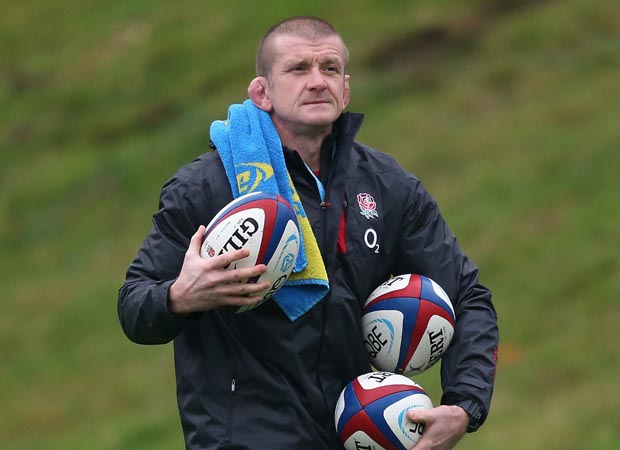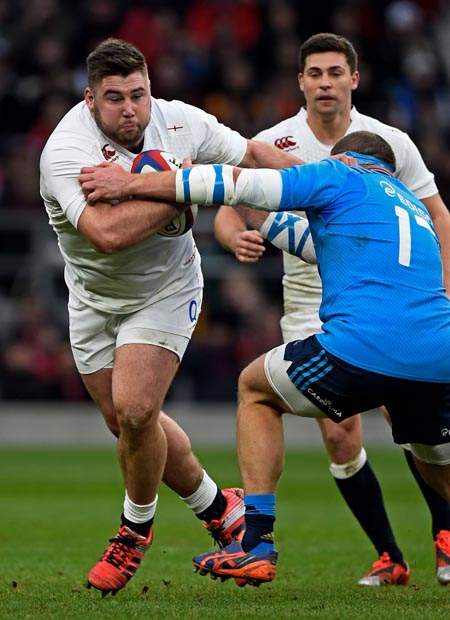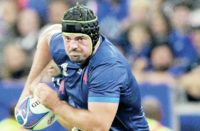 Graham Rowntree wants a pack for all seasons. An England eight that can grind the opposition like a millstone one minute, run them off their feet the next, and then scrummage them into submission. He wants heavy-duty assassins with so many weapons in their armoury that the only choice they have to make is which one they select to finish the job.
Graham Rowntree wants a pack for all seasons. An England eight that can grind the opposition like a millstone one minute, run them off their feet the next, and then scrummage them into submission. He wants heavy-duty assassins with so many weapons in their armoury that the only choice they have to make is which one they select to finish the job.
The next job is Ireland, in a round three clash in Dublin on Sunday. It is a clash which could easily decide whether England take the Six Nations title off the hosts, and set themselves up for a Grand Slam tilt, or whether they have to make do with second best for a fourth successive season.
Rowntree has been around too long to talk up his men, and he has consistently resisted attempts by England's cheerleaders to endorse their claim that he now has the best pack in the world. As England forwards coach for the last six years, the former Lions, England and Leicester loosehead, knows that such claims are tempting fate, especially as his crew were outplayed at times by the New Zealand and South Africa packs in the autumn.
However, the signs over the last six months indicate strongly that while the England forwards may still be a work in progress under Rowntree, the advances that have been made recently are spectacular – especially in terms of depth, and cut-throat competition for places.
Against Wales and Italy despite being forced by injuries to change over half his pack – with tighthead David Wilson, first-choice lock pairing of Joe Launchbury and Courtney Lawes, blindside Tom Wood, and No.8 Ben Morgan, all sidelined – the replacements emerged with huge credit.
So much so that Rowntree admits that the likes of Dave Attwood, George Kruis, James Haskell and Kieran Brookes have given him a huge selection headache – not that he's complaining.
There is a quiet confidence about Rowntree as he contemplates the trip across the Irish Sea, and it is the sort that comes from a coach who knows that he has got his training template more or less where he wants it.
Ask him what he has done to move the England pack on and he says: “We have changed a major component. We do a lot more under pressure in training. A lot more live scrum, maul and lineout, and we do it fast, because the game is about what you do when you're knackered. It's about making clear decisions when you are under duress. There's a lot more fast and pressured training – a lot done when they're fatigued.”
He adds, “Forwards have to be good at a lot of things these days, and I feel for them. Things like catching and passing – I could never do that!”

The quip is typical Rowntree, and it his steadiness and refusal to be submerged by the torrent of pressure and expectation at international level, that has made him a favourite with players and Press alike.
Then he's back in coach mode. “It's quick, and it's planned and very accurate in a live environment, but without killing them. We don't keep them out there very long because you need petrol in the tank for the weekend. It's short and intense, because that's what the Test arena is.”
He says that is why the England coaches were disappointed with the defence in the Italy game, and leaking three tries. “That is just not us. ‘Faz' (Andy Farrell) was quite direct in his defence meeting saying there were elements that were just not good enough – the frustrating thing being that the lads played exceptionally well against Wales, and set new benchmarks. We had to reach those again against Italy, and we didn't.”
Suggest that it may be inevitable that against Italy you fall off because you are expected to win and Rowntree explains where he sets the bar. “Subconsciously, maybe. But if you want to be a pro – be the best – look at the All Blacks. I'm sick of talking about them to be fair, but they put teams like that away by a cricket score. But if you'd said to me on Saturday morning that you're going to win and score nearly 50 points, I'd have said, ‘thank you'.
Ireland are an entirely different proposition, according to Rowntree, who has first-hand knowledge of working with the likes of Paul O'Connell, Rory Best, Cian Healy, Sean O'Brien and the injured Jamie Heaslip, from being forwards coach for the 2009 and 2013 Lions.
Rowntree says: “I've immense respect for them. Having worked with Lions I was impressed by their professionalism. O'Connell's not as young as he was, but he's still keen as ever. The Irish lads would be among the first doing their homework on the computer after Lions training – very diligent. ‘Paulie' (O'Connell) would always be the first to congratulate someone if they'd done something good, and you can see how the other guys wanted to play for him. He's a real leader. He'd go up to players after training and ask them to show him something so that he can get better. There's a guy who's won everything, so I've a lot of respect for him.”
He calls the injury to Heaslip “terrible”, even though Pascal Pape's knee may have cost Ireland and helped England. “That's no way to miss a Championship, with three cracked vertebrae. He's an ultimate all-rounder – ball skills, grunt work, and tackle work all right up there with the best”. And as for Pape? “You can't do that – as a coach if I'd lost a player to that injury I'd be pretty unhappy.”
Rowntree says, however, that Ireland are good enough to absorb the setback and still be formidable.
“Whoever Ireland pick, they've got good options, like Jack McGrath for Healy, and the experience of Best, Mike Ross, and Devin Toner. They made life difficult for us two years ago. They've always got this driving maul threat, and this DNA of an Irish forward where everyone can see what a challenge it is to win good breakdown ball off them. And they've got this choke tackle – particularly Best. It's a massive focus in Irish rugby to give the other team what they do not want, and we'll be looking to do that too.”
Rowntree expects the breakdown battle to be brutal, but stresses that if England are to get on top then brains are more important than brawn.

“The Irish have this ability to get in and challenge for the ball, get a boot or body in there, and just make it a complete mess. It's a mind-set, and it's handed down. Look at Munster – even back as far as Keith Wood, Mick Galwey, Mick Clohessy when I played – and then Leinster after Michael Cheika took them on board. You've got to do it well otherwise you get guys taking themselves out of the game – if you overcommit to a breakdown you're not going to win, then you are suddenly exposed elsewhere.”
He adds: “You need that No.7 pressure on the opposition, for sure. Chris Robshaw has carried that on from the autumn and James Haskell has also been doing that well. But I want all of our forwards to be that scavenger and see that window of opportunity to nick the ball. We are making gains there all the time in turn-overs won, and opposition ball-speed, especially in the last six months.”
Rowntree says that stopping the potent Irish driving maul will be non-negotiable, despite laws that make it very difficult to defend legitimately: “You've got to stop it at source. You have to put the jumping pod under pressure, legally, as soon as possible in the air and as soon as they hit the deck. You then have to try to fracture that pod by hitting it again, and again.”
He warns that if you allow teams like Ireland and South Africa to set-up the maul on their own terms, you will struggle. “They make it very difficult to defend legally because they get good width at the front and make it very long in terms of depth, with the ball-carrier at the back. It's a bit like the conga line which was outlawed a couple of seasons ago when teams were stretching back in single file from a maul to give their scrum-half an unchallengeable clearance.”
Rowntree says that England still have lineout headway to make before he is satisfied.
“Our lineout is alright, but there's so much more we have to be better at. No disrespect to Wales and Italy, but we now play three exceptional lineouts (Ireland, Scotland and France) where there is so much movement, shape in the air, and everyone knowing their roles. You have to hit your scrum-half in motion with the delivery – it's a real art.”
He elaborates: “As a player I was just a lifter, but as a coach you're surrounded by all these lineout nerds. It's like chess, and I really respect their diligence. Dave Attwood has taken that senior role on very well in Courtney Lawes' absence, and George Kruis has blown me away. He's obviously learned a lot from Steve Borthwick at Saracens, and his understanding of detail is very impressive. He's a very composed young man.”
Yet, Rowntree reveals that it is his responsibility to keep the lineout as uncomplicated as possible. “The challenge for me is to keep the lineout menu relevant, so that the moves we practice in the week are the ones we use at the weekend…otherwise these nerds can get carried away.”
He says that a key component is anticipating how many lineouts the opposition will give you. “Against Wales we knew they'd try to keep the ball in play, so we'd probably only get nine throws or fewer, whereas other teams with very good defensive lineouts, like South Africa, might kick it out 23 times. With Eben Etzebeth and Victor Matfield they'll put the ball off the field and challenge you to win it, and your menu has to reflect that.”
England have enviable second-row depth in Rowntree's opinion, but he says the demands on locks to be all-round footballing athletes has never been greater.
“Where Attwood is the more traditional tighthead lock who is a very good scrummager, but has shown good skill in the loose, Launchbury is the pure hybrid who could play six just as well as lock, with Lawes similar, while Kruis has an incredible engine.
“But it's like tighthead props. You cannot just have your traditional lump who's not very mobile. All these guys have got to be able to defend Quade Cooper or Aaron Smith in a ten-metre box. They can't just be tanks – so they are all hybrids to a degree.”
He adds, “We measure how long they're off their feet on the floor, because they need to be up and doing something else. The have to be so fit, because there's a huge expectancy of them.”
Rowntree also accepts there are great expectations of the England scrum, not just in Dublin but going forward to the World Cup, and he says he is delighted to see it back as a contest.
“The scrum is one of the cornerstones of the game. That's what I love about the sport – it's a major battle within the war of a game. We have to strive to hold onto the scrum, and I like the new scrum interpretation. Collapsed and reset scrums as a coach are embarrassing. You've got your hand in that, that's your area.”
Rowntree argues that crooked feeds are a tell-tale sign of teams who are not confident in their scrummaging, and urges referees to apply the law.
“If you have another scrum under pressure and a crooked feed gets them off the hook, you feel frustrated. All I can say is that as a coach I tell our scrum-halves to put the ball in straight, because we're good enough to win it. A scrum-half will only put the ball in crooked if he knows his scrum isn't good enough.”
Rowntree is enthusiatic about the layers of front-row forwards coming into contention for England outside established tightheads like Dan Cole and David Wilson, and looseheads of the calibre of Joe Marler, Alex Corbisiero, Mako Vunipola and Matt Mullan.
“Kieran Brookes has really impressed me. He's an incredibly strong man, but he's still learning about the rigours of international rugby, where things can happen very quickly. You've got him and Henry Thomas. I speak to our lads about impact off the bench and lot of them say, ‘I don't want to be known as an impact player'. Well, that was an incredible performance by that Bath front-row bench in Toulouse. Nic Auterac, Ross Batty and Thomas is a fair unit to bring off the bench.”
So, have England ever been stronger in terms of front five resources? Rowntree is cautious in response: “I'll let you know at the end of this year.
“It's going to be a true test. I don't like speaking about the World Cup too much because we've got enough on our plates in the here and now. We will be tested in this Six Nations, and we've got some real selection headaches because guys keep putting their hands up.”
From the outside, however, it looks like it could be coming up roses for Rowntree, because the seeds for his pack for all seasons have taken root.


























